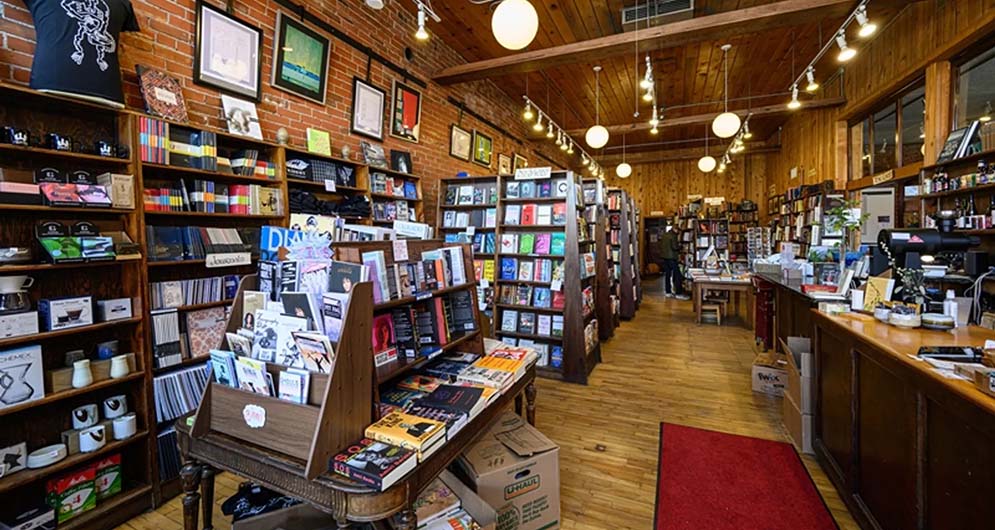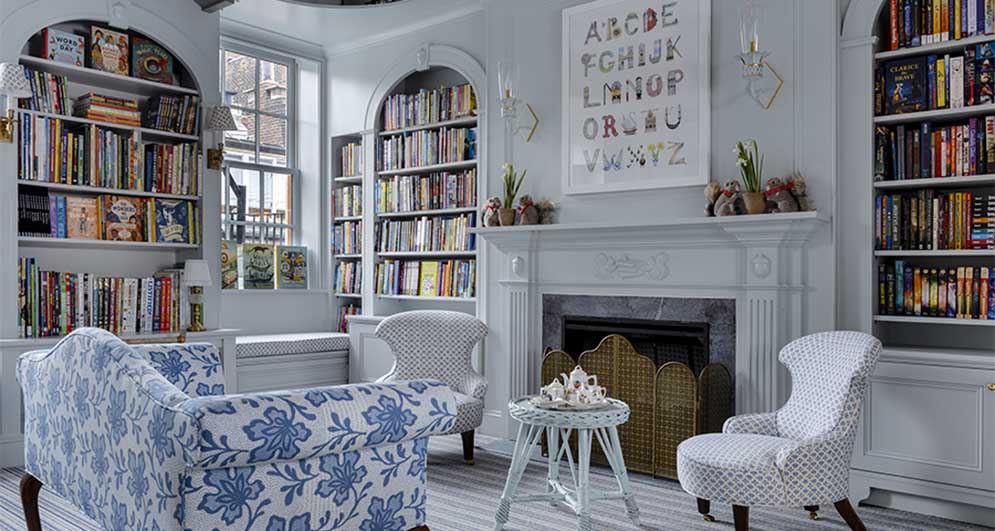There are cities you visit for food, for fashion, for adventure. And then there’s Boston — a place you walk into like a living library. Its cobblestone streets hold stories, its skyline whispers history, and tucked into almost every neighborhood, there’s a bookshop waiting for you to step in and stay a while.
For someone who finds peace in the scent of old paper and joy in a well-curated table of staff picks, Boston is a treasure trove. During my recent trip, I decided to take a detour from the usual tourist path and go on a bookstore pilgrimage — part literary exploration, part love letter to the city’s reading culture.
Chapter One: Back Bay Beginnings at Trident Booksellers & Café
My literary journey began on Newbury Street — a boulevard better known for high-end fashion than hardcover fiction. But tucked among designer boutiques and polished storefronts is Trident Booksellers & Café, a place that quietly steals the spotlight without trying to. It’s not flashy. It doesn’t need to be. With its cozy energy and unapologetically bookish charm, Trident draws you in like a favorite worn-in novel.
From the moment I stepped inside, I felt at home. The air was thick with the scent of coffee and syrup, the low murmur of conversations, and the comforting rustle of pages being turned. It’s a rare space that invites you to both wake up and slow down. I ordered a matcha latte and a breakfast quesadilla — both surprisingly excellent — and carried them upstairs, where mismatched tables and worn chairs offered front-row seats to one of Boston’s most unpretentious cultural stages.
The shelves brimmed with new releases, staff favorites (complete with handwritten mini-reviews), thought-provoking non-fiction, and niche poetry zines I didn’t expect to find outside Brooklyn. College students, solo travelers, and curious locals mingled effortlessly — some typing away on laptops, others buried deep in a paperback, all welcomed to stay as long as they liked.
Trident isn’t just a stop on the map; it’s a warm, living part of Boston. The kind of place where time bends slightly and books become not just objects, but company.

Chapter Two: South End’s Hidden Gem — More Than Words
A short subway ride brought me to More Than Words, a nonprofit bookstore operated by youth who are part of Boston’s foster care and court-involved programs. Tucked into a quiet street, this place radiates purpose.
The selection is entirely secondhand — well-organized, gently priced, and thoughtfully curated. There’s a powerful energy here: one of hope, resilience, and quiet transformation. Every book you buy supports job training, mentorship, and second chances.
I picked up a used copy of The Bell Jar with a handwritten note inside: “To whoever finds this, remember to breathe.” That’s the kind of bookstore this is — one where every book has lived a little, and every shelf feels personal.
Chapter Three: Cambridge Calling — Harvard Bookstore
No bibliophile can come to Boston and not cross the Charles River to visit Harvard Square. The Harvard Bookstore (not affiliated with the university) stands proudly on Massachusetts Avenue, a true landmark since 1932.
Unlike chain bookstores, this one blends intellectual rigor with community charm. It’s spacious, lined with high wooden shelves, and brims with both academic texts and mainstream literature. The front tables are stacked with recent releases, while the back leads to a dreamy used-book cellar.
The basement was, unsurprisingly, my favorite part. It smells like the kind of book you’d find in your grandfather’s attic — comforting and nostalgic. I spent nearly an hour down there, flipping through out-of-print travel memoirs and vintage philosophy texts, all priced generously.
The staff here are readers first, booksellers second. Ask for a recommendation, and you’ll find yourself in a passionate conversation about narrative structures, unreliable narrators, or the evolution of postmodern fiction. It’s that kind of place.
Chapter Four: A Brief Pause: Brattle Book Shop
Returning to Boston proper, I stopped at Brattle Book Shop — one of America’s oldest used bookstores, founded in 1825. It’s famous not just for its age, but for its outdoor lot. Yes, outdoor.
In a quiet alley just off West Street, tall shelves stand in the open air, filled with secondhand books priced from $1 to $5. It feels like a secret, this urban garden of words. The weather was kind, so I browsed leisurely, smiling at the sheer absurdity of reading under fire escapes in the middle of the city.
Inside, Brattle is more traditional — three stories of rare and antique books, old maps, first editions, and historical curiosities. I didn’t plan to buy anything rare, but somehow left with a leather-bound collection of Emerson essays. Blame Boston for that one.
Chapter Five: Papercuts J.P. — Jamaica Plain’s Literary Soul
The next morning, I took the Orange Line to Jamaica Plain, a neighborhood full of trees, families, and progressive spirit. Here lies Papercuts J.P., a small but fiercely independent bookstore with one of the most thoughtfully curated selections I’ve ever seen.
There’s a particular art to making a small space feel endless — and Papercuts has mastered it. Every title felt intentional. There’s a spotlight on underrepresented voices, local writers, and debut authors. If you love discovering books before they become bestsellers, this is your place.
It was here I discovered The Rabbits by Sophie Overett, a novel I’d never heard of but now deeply cherish. The staff don’t just recommend — they advocate. You can sense the passion behind every handwritten blurb taped to the shelves.
Bonus points for the tote bags. Yes, I bought one.
Chapter Six: The Final Stop — Beacon Hill Books & Café
Beacon Hill, with its gas-lit streets and Federal-style rowhouses, feels like a Jane Austen novel come to life. Nestled among the brick facades is Beacon Hill Books & Café, a relative newcomer with an old soul.
Every room of this multilevel bookstore is designed like a cozy reading nook — complete with antique chairs, curated bookshelves, and soft lighting. There’s a children’s floor that looks like something out of a fairytale, and a garden café where you can sip tea among ivy and climbing roses.
It’s the kind of place that slows you down. You walk softer, talk quieter. It’s less about hunting for a specific book and more about letting the space suggest what you might need. I left with a botanical-themed cookbook and a peaceful state of mind.

What began as a casual itinerary — a few bookstores mapped out between meals and museums — quickly evolved into something far more meaningful: a quiet, thoughtful journey into Boston’s soul. It’s easy to be swept up by the city’s grand architecture, rich revolutionary history, and world-class institutions, but there’s another Boston that breathes more quietly beneath the surface. You find it in the indie bookstores — places where the past and present meet on paper, and where the culture of the city is distilled into stacks and shelves.
Bookstores aren’t just retail spaces. Not here. In Boston, they are community anchors, storytelling sanctuaries, and creative laboratories. They reflect the city’s values: its love for knowledge, its respect for diverse voices, its desire for conversation and reflection. More importantly, they reflect its humanity — messy, passionate, curious, and infinitely resilient.
Boston’s independent bookstore scene is not only surviving in the digital age; it’s flourishing, often fueled by the very desire to disconnect from screens and reconnect with physical spaces, real conversations, and tangible stories. Each place I visited on this literary trail offered more than just titles and transactions — they offered different philosophies of how books can live in the world:
Trident Booksellers & Café showed me that books and community are best served with a hot drink and a side of laughter. It reminded me that reading doesn’t have to be solitary; it can be a shared, joyful experience.
More Than Words moved me with its mission — proving that literature can uplift lives far beyond the page, offering second chances and new beginnings.
Harvard Bookstore blended intellect and warmth, showing that you don’t have to choose between academic rigor and heartfelt conversation. It felt like the beating heart of Cambridge.
Brattle Book Shop whispered secrets of time, memory, and the magic of serendipity — reminding me that sometimes, the best stories are the ones you don’t expect to find.
Papercuts J.P. proved that small doesn’t mean lesser. In fact, its tiny footprint left one of the deepest impressions — a space that champions underrepresented voices with fierce purpose and grace.
Beacon Hill Books & Café invited me to slow down, breathe, and let literature be not just informative, but healing. It was an experience as much as a store.
If you ever find yourself in Boston, weary from museum tours or dizzy from historical trivia, take a break. Step off the beaten path. Find a bookstore. Let it pull you in. Let the hush of pages recalibrate your senses. Let the shelves, the staff, and the stories remind you why cities matter — not for their monuments, but for the people who keep storytelling alive.
Because in Boston, you don’t just read the stories.
You walk through them.
And if you’re paying attention, they walk with you too.
